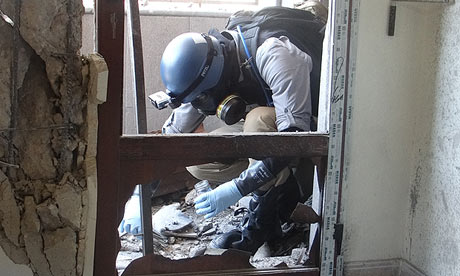Syrian chemical attack used sarin and was worst in 25 years, declares UN
Chemical attack on rebel-held areas of Damascus involved rockets known to be in Syrian regime's arsenal, say experts
Julian Borger, Diplomatic editor, The Guardian, Monday 16 September 2013 22.02 BST, Source
The UN has confirmed that the worst chemical weapons attack in 25 years took place in eastern Damascus last month, involving specially designed rockets that spread sarin nerve agent over rebel-held suburbs of the Syrian capital.
The report did not assign blame for the attack but the US, Britain and France said the details on the sarin, the rockets used and their trajectories all proved that Bashar al-Assad's regime was responsible.
However, Russia argued that the western powers had "jumped to conclusions" and said claims of rebel use against their own supporters to provoke foreign intervention "should not be shrugged off".
There was also sharp disagreement about what kind of UN resolution was needed to implement the agreement struck by the US and Russia on Saturday in Geneva on dismantling the Assad regime's chemical weapons programme.
The differences – on whether an initial resolution should include the threat of punitive measures for Syrian non-compliance – were a reminder that the Geneva agreement could still unravel before it is put into force.
Presenting the report, the UN secretary general, Ban Ki-moon, said: "This is the most significant confirmed use of chemical weapons against civilians since Saddam Hussein used them in Halabja in 1988. The international community has pledged to prevent any such horror from recurring, yet it has happened again."
However, Ban did not say who was responsible for the attack, noting that was not in the mandate of the UN investigation.
"It is for others to pursue this matter further to determine responsibility. We will all have our own thoughts on this," the secretary general said.
Presenting their arguments afterwards, western diplomats said the head of the UN investigation team, Åke SellstrÖm, a Swedish scientist, had observed that the quality of the sarin used in the attack on western and eastern Ghouta suburbs on 21 August was higher than that used in the 1995 terror attack on the Tokyo underground or Saddam Hussein's attack on the Kurdish town of Halabja.
SellstrÖm also said the rockets used were professionally made. His report said they were fired from the north-west, and western officials said the details of the trajectories confirmed that they came from an area held by government troops.
"All of that confirms in our view there is no remaining doubt that it was the regime that used the chemical weapons. It confirms that the regime was responsible," Mark Lyall Grant, the British envoy to the UN, said.
His American counterpart, Samantha Power, singled out evidence in the UN report on the calibre of rocket used, saying that in "thousands of videos" from the Syrian conflict there was no indication that the rebels had such weapons. Nor was there any evidence that the rebels possessed sarin, she added.
"The technical details of the report make clear that only the regime could have carried out this chemical weapons attack," Power said. The French ambassador, Gerard Araud, echoed her conclusions.
However, the Russian ambassador, Vitaly Churkin, complained: "Some colleagues jumped to conclusions when they said the attack was by government forces. We have not even had a chance to look at the report. We have just had a quick glance. The allegations that it was the opposition cannot be simply shrugged off."
The SellstrÖm report noted the kind of rockets used and pointed out that they had been fired from the north-west in the early hours when the air was moving downwards, maximising casualties.
"Chemical weapons use in such meteorological conditions maximises their potential impact as the heavy gas can stay close to the ground and penetrate into lower levels of buildings and constructions where many people were seeking shelter," it said.
The report said that one of the rockets analysed was an M14 rocket, which had been fired by a multiple rocket launcher. The second was a 330mm rocket.
Peter Bouckaert, a weapons specialist at Human Rights Watch, said: "The rocket systems identified by the UN as used in the attack – truck-launched 330mm rockets with around 50 to 60 litres of sarin, as well as 140mm Soviet-produced rockets carrying a smaller sarin-filled warhead – are both known to be in the arsenal of the Syrian armed forces. They have never been seen in rebel hands."
The Organisation for the Prohibition of Chemical Weapons is expected to meet in the coming days to endorse the Geneva agreement on the disarming of Syria's chemical weapons stockpile.

A UN inspector takes samples at a site in Damascus of what the UN has called the worst chemical weapons attack since Hallabja. Photo: Erbin News/Demotix/Corbis
